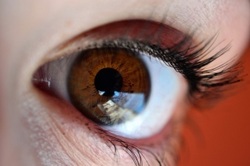
Eye-sight is one of the human senses that is the simplest for one to take for granted. For someone born into the world along with his capability to view complete and operating flawlessly, it is difficult to assume ever being without them. Getting up each morning, the action of opening your vision is met with by the streaks of early natural light arriving from the window. You wake up, have a shower, select your clothing for the day, give the newspaper a fast check out, then step out of the house, reveling in the commotion of activity among the people, pets, and vehicles going about on their way. The scene is the same daily.
However what if the very next day you get up, you feel an unusual clouding of your vision, a definite pain in one or both of your eyes, or find a mind boggling swelling? While these may be signs of a common irritability of the eye, there is a unpleasant fact that it may already be symptoms of something a lot more difficult as compared with just an irritation. These are symptoms of uveitis, the inflammation of the middle layer of the eye called the uvea. The uvea provides most of the blood needed by the retina.
While you may have never ever heard about this condition before and probably asking the question "what is uveitis?" for the very first time. Basically, there are more dangerous kinds of uveitis that have been the reason for one out of ten cases of loss of sight in England. On the other hand, despite the fact that a variety of traumas, infections, or underlying situations might be feasible causes of uveitis, in around one in every three cases, no identifiable cause is found.
Older people who are afflicted with uveitis might have warning signs such as light sensitivity and eye soreness, which could make them to visit the doctor or eye clinic and perhaps avoid the condition from getting worse. Uveitis commonly impacts people aged 20 to 59, but children cannot be considered safe from it either. Sadly, in kids, no signs may appear by any means until vision is completely lost.
Assessment with a professional eye doctor for any signs at all, therefore, is recommended to steer clear of the advancement of uveitis to untreatable, sight-threatening stages. The primary remedy for uveitis patients is corticosteroids which effectively reduce and remove the swelling or inflammation within the eye.
Many instances of uveitis react quickly to remedy, but people that experience repetitive attacks are more prone to develop long-term harm to the eyes and, eventually, vision loss. It's essential to confirm a diagnosis and begin the right treatment as soon as possible to avoid disastrous effects. As soon as the very first detection of signs, or maybe if you think no suspicious indicators by any means, accumulating sufficient uveitis information can cause the gap between getting up to another gorgeous morning and living in blurred, darkened vision to any extent further.
However what if the very next day you get up, you feel an unusual clouding of your vision, a definite pain in one or both of your eyes, or find a mind boggling swelling? While these may be signs of a common irritability of the eye, there is a unpleasant fact that it may already be symptoms of something a lot more difficult as compared with just an irritation. These are symptoms of uveitis, the inflammation of the middle layer of the eye called the uvea. The uvea provides most of the blood needed by the retina.
While you may have never ever heard about this condition before and probably asking the question "what is uveitis?" for the very first time. Basically, there are more dangerous kinds of uveitis that have been the reason for one out of ten cases of loss of sight in England. On the other hand, despite the fact that a variety of traumas, infections, or underlying situations might be feasible causes of uveitis, in around one in every three cases, no identifiable cause is found.
Older people who are afflicted with uveitis might have warning signs such as light sensitivity and eye soreness, which could make them to visit the doctor or eye clinic and perhaps avoid the condition from getting worse. Uveitis commonly impacts people aged 20 to 59, but children cannot be considered safe from it either. Sadly, in kids, no signs may appear by any means until vision is completely lost.
Assessment with a professional eye doctor for any signs at all, therefore, is recommended to steer clear of the advancement of uveitis to untreatable, sight-threatening stages. The primary remedy for uveitis patients is corticosteroids which effectively reduce and remove the swelling or inflammation within the eye.
Many instances of uveitis react quickly to remedy, but people that experience repetitive attacks are more prone to develop long-term harm to the eyes and, eventually, vision loss. It's essential to confirm a diagnosis and begin the right treatment as soon as possible to avoid disastrous effects. As soon as the very first detection of signs, or maybe if you think no suspicious indicators by any means, accumulating sufficient uveitis information can cause the gap between getting up to another gorgeous morning and living in blurred, darkened vision to any extent further.
 RSS Feed
RSS Feed